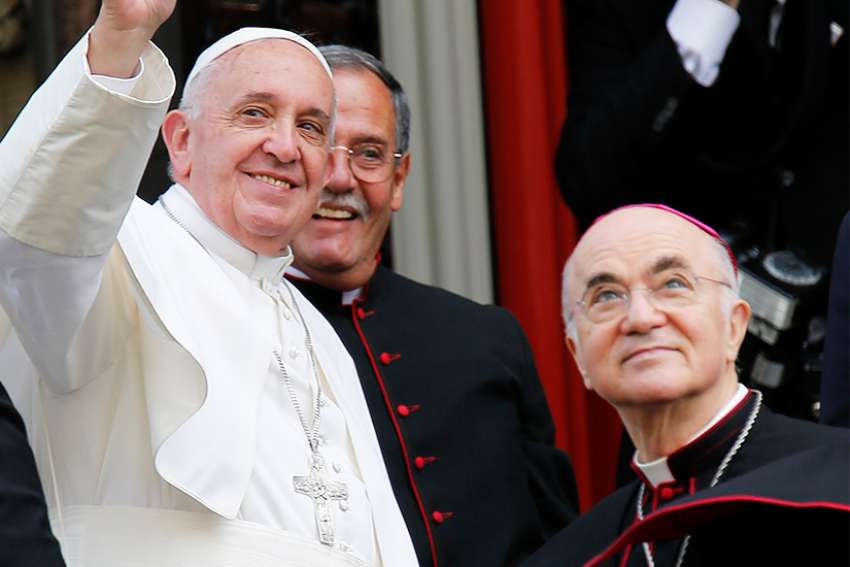Vigano also denied charges that he is in rebellion against Pope Francis.
Responding to an Oct. 7 letter from the Vatican’s prefect for the Congregation for Bishops, Cardinal Marc Ouellet, Vigano said he is not urging anyone to “topple the papacy,” and that he prays for Pope Francis daily – more than he has for any other pope – urging the pontiff to “admit his errors, repent.”
However, Vigano’s Oct. 19 statement also defended his decision to “bear witness to corruption in the hierarchy of the Catholic Church,” which he called a painful decision. He said he believes his further silence would cause damage to souls and “certainly damn” his own.
Responding to the charge that he has created confusion and division in the Church with his testimony, Vigano said “impartial observers” know there was already an excess of both, a situation which he blames at least partially on Pope Francis.
Confusion and division, he said, “is inevitable when the successor of Peter is negligent in exercising his principal mission, which is to confirm the brothers in the faith and in sound moral doctrine. When he then exacerbates the crisis by contradictory or perplexing statements about these doctrines, the confusion is worsened.”
"Therefore I spoke. For it is the conspiracy of silence that has wrought and continues to wreak great harm in the Church -- harm to so many innocent souls, to young priestly vocations, to the faithful at large."
Vigano’s statement outlines the principal claims he made in his original Aug. 25 testimony about Archbishop Theodore McCarrick and the knowledge he says the Vatican and Pope Francis had regarding of the ex-cardinal’s sexual abuse of seminarians.
Vigano’s latest testimony also summarizes what he considers Ouellet’s main arguments.
“In brief, Cardinal Ouellet concedes the important claims that I did and do make, and disputes claims I don't make and never made.”
Refuting a claim by Ouellet, that the Holy See was only aware of “rumors” about Archbishop McCarrick and nothing further, Vigano said that “to the contrary, that the Holy See was aware of a variety of concrete facts,” and has documentary proof in the appropriate archives, where “no extraordinary investigation is needed to recover them.”
"The crimes reported were very serious, including those of attempting to give sacramental absolution to accomplices in perverse acts, with subsequent sacrilegious celebration of Mass."
The attempted sacramental absolution of an accomplice in a sin of sexual immorality is a "grave delict" in the Church's canon law, for which a priest can be punished with excommunication.
Vigano conceded a statement from Ouellet’s letter that there were not canonical “sanctions” against Archbishop McCarrick (as claimed by Vigano in his original testimony) but that there were “conditions and restrictions” against him.
He said that he believes “to quibble whether they were sanctions or provisions or something else is pure legalism. From a pastoral point of view they are exactly the same thing.”
The archbishop argued that the public criticism against him following his August testimony was silent on two topics: the situation of the victims and the “corrupting influence of homosexuality in the priesthood and in the hierarchy.” It is not a matter of politics or “settling scores,” he said, but “about souls.”
He said it is “an enormous hypocrisy” to condemn abuse and feel sorrow for victims, but not denounce the “root cause” of much sexual abuse: homosexuality within the clergy. He also accused homosexual clergy of “collusion,” and called clericalism an instrument of abusers, but not the “main motive.”
“I am not surprised that in calling attention to these plagues I am charged with disloyalty to the Holy Father and with fomenting an open and scandalous rebellion,” for calling attention to “homosexual corruption,” he said.
Vigano ended his testimony by asking any priests or bishops who have access to documents, or who have other knowledge, to testify to the truth of his statements.
“You too are faced with a choice,” he charged. “You can choose to withdraw from the battle, to prop up the conspiracy of silence and avert your eyes from the spreading of corruption” or choose to speak, he said.
Archbishop Vigano's Thi... by on Scribd


